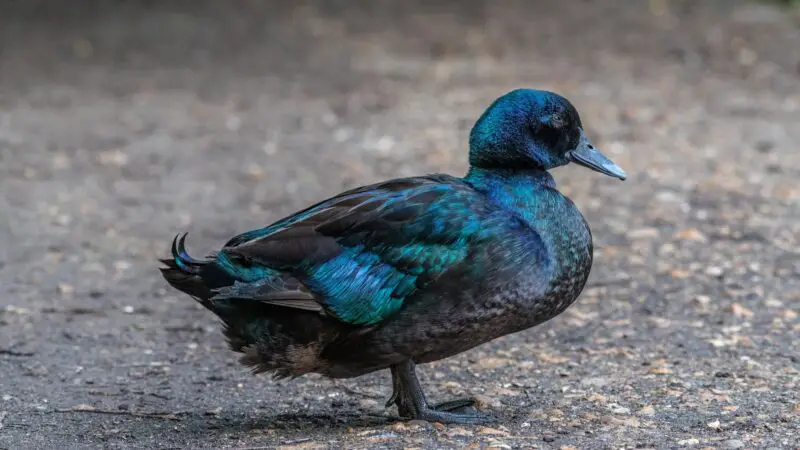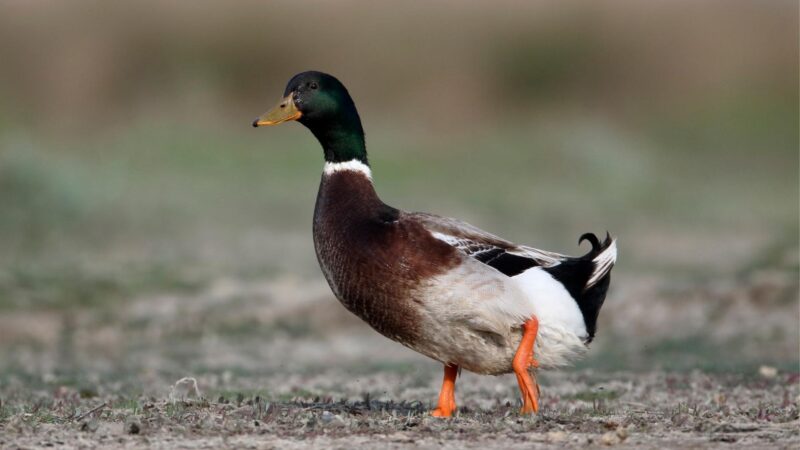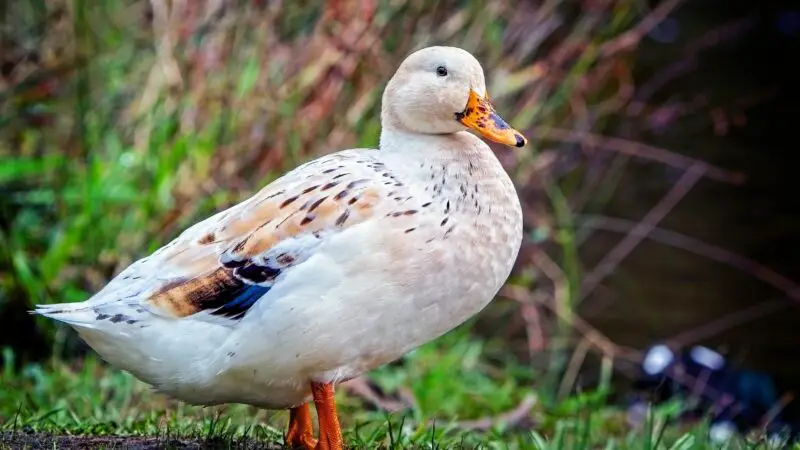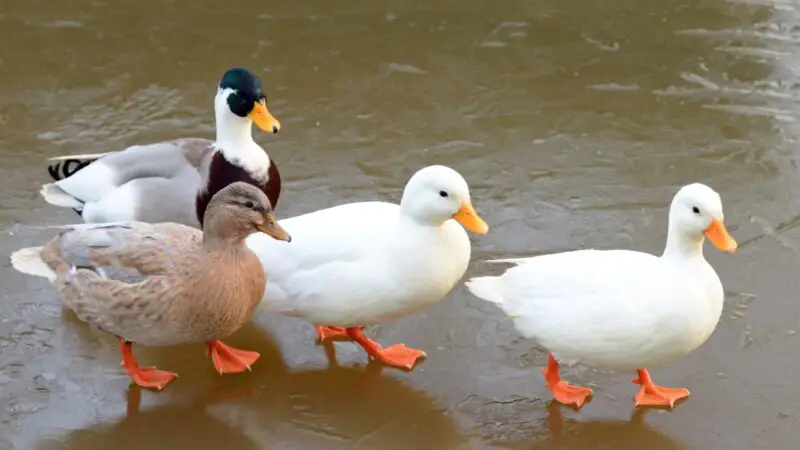Ducks and chickens seem to coexist peacefully in most farm settings. Despite being different species of birds, these two are known to get along quite nicely. Is it because of how the farmer raised them? Or is one breed just nicer than the other? This article will give you the answers.
Ducks are generally friendlier than chickens and this is evident with their calm and more tolerant attitude towards humans. Ducks like the Pekin, Cayuga, Call, Rouen, and Welsh Harlequin are particularly known for their docile temperament.
Nevertheless, that is merely a generalization since there are aggressive duck breeds as well as non-aggressive chicken breeds.
What Makes Better Pets: Ducks or Chickens?
Ducks make better pets because of their generally calm nature. But aside from their docile temperament, there are several reasons why ducks make better pets than chickens.
- Ducks are quite social. Unlike chickens, ducks do not mind the company of humans and other animals.
- Ducks are generally non-aggressive. They are quite calm and not easily surprised, so they don’t usually fight back if you pick them up. That makes them great with kids.
- Ducks are not as noisy as chickens. In general, ducks are not as noisy as roosters, especially if you need peace in the morning.
- Ducks are easy to care for. Ducks thrive on land, air, and water, which allow their bodies to acclimate to different weather conditions. Additionally, ducks are more resistant to certain diseases compared to other birds.
- Ducks make low-maintenance pets. As long as they have water and a cozy coop to sleep in, ducks don’t need much to be happy and healthy.
Which Is More Aggressive: Ducks or Chickens?
In general, chickens are known to be more aggressive than ducks. Particularly, roosters tend to be territorial and are willing to fight when they feel threatened. And while hens are more tolerant of humans, they won’t hesitate to fight back when it means protecting their eggs or their young.
Nevertheless, several chicken breeds are known for their docile temperament. Breeds like silkies and the Jersey giant are quite gentle and rarely show any aggression. While the silkie rooster and the Jersey giant rooster are also territorial, they are not as hostile as other roosters.
But while ducks are less aggressive, there are some duck breeds that you do not want to mess with. Take the steamer duck, for example. Steamer ducks have a reputation for being violent and are known to show aggression towards humans. That’s a breed you want to steer clear of.
Do Ducks Get Attached to Humans?
Ducks do get attached to humans. Although rare, some ducks tend to imprint on humans, especially when they were already separated from the hen before they hatched.
A study reveals that the first days after hatching are important for ducks. During this period, the ducklings develop a sense of who to follow based on who they first get a glimpse of after hatching. This naturally happens between ducklings and their mother, but there are instances of abnormal imprinting behavior with humans. That’s when they become attached to humans.
Do Ducks Like to Cuddle?
Ducks love to cuddle. It may not seem like it, but ducks are quite affectionate. One of the ways they show their affection is through cuddling. It includes sitting on your lap or simply running to you to get some snuggles.
Ducks create an attachment to humans through their imprinting behavior. Additionally, ducks develop a sense of familiarity with humans who take care of them. As a result, they learn who to trust and often show their gratitude by cuddling.
Friendliest Duck Breeds
Cayuga

Cayuga ducks are among the most docile duck breeds, especially when they grew up under human care. They’re also quite playful, making them great with children. Aside from being friendly, Cayuga ducks are also quiet. That makes them perfect if you live with a neighbor close by.
- Appearance: Cayuga ducks are quite stunning, especially with their iridescent green or blue feathers that stand out against their black feathers. They also have black beaks and a pair of short black legs and feet.
- Lifespan: 8 to 12 years
- Height: 4 to 5 inches
- Weight: 6 to 8 pounds
- Wingspan: Unknown
- Place Of Origin: New York
- Characteristics: Quiet, docile
Rouen

The Rouen duck is another friendly duck breed. Known for being tame and social, they can easily love well with other ducks or birds. However, you may have to watch out for Rouen drakes during mating season – they tend to be aggressive during that time.
- Appearance: Rouens are easily distinguishable, thanks to their dark green-feathered head and tail. It has a white-colored ring at the center of its long neck, which separates its dark green-colored upper neck and brown-colored lower neck and body.
- Lifespan: 8 to 12 years
- Height: Unknown
- Weight: 6 to 10 pounds
- Wingspan: Unknown
- Place Of Origin: France
- Characteristics: Tame, docile
Pekin

When it comes to the friendliest duck breeds, there’s no doubt that the Pekin deserved to be on the list. They’re playful and love being around humans and other animals, making them great companion ducks. Pekin ducks are also great egg layers, so if you’re considering farming ducks, you can’t go wrong with them.
- Appearance: Pekin ducks have white to creamy white plumage and yellow bills, legs, and feet. But what makes them stand out from other ducks is that they have a rather upturned rump, which is unusual for most ducks. As a result, they have a more upright carriage of their bodies.
- Lifespan: 5 to 12 years
- Height: 15 to 20 inches
- Weight: 7-9 pounds
- Wingspan: Unknown
- Place Of Origin: China
- Characteristics: Upturned rump, upright stance, noisy
Welsh Harlequin

The Welsh Harlequin is another friendly duck that you might want to consider adding to your flock. They’re curious and incredibly calm, so you don’t have to worry about them not getting along with other birds. But, they are active foragers, which means they need a bit more space than others.
- Appearance: Welsh Harlequins have elongated bodies covered in brown feathers. Their heads are either covered in iridescent green or white feathers, which largely depends on their age. They also have brown to dark brown bills, legs, and feet.
- Lifespan: 10 years
- Height: Up to 15 inches
- Weight: 4 to 5.5 pounds
- Wingspan: Unknown
- Place Of Origin: Wales
- Characteristics: Placid, unable to fly
Call

Call ducks are among the smaller duck breeds but are quite full of energy. The call duck is so named because they were originally used by hunters to lure in or call other duck breeds. With that said, call ducks can be quite loud and noisy and may not be the best option if you have neighbors living nearby.
- Appearance: Call ducks have small rounded bodies covered in white feathers. They also have short necks and black or dark brown beady eyes that add to their charm. Like the Pekin duck, their beaks, legs, and feet are yellow.
- Lifespan: 4 to 8 years
- Height: Up to 13 inches
- Weight: 18 to 26 ounces
- Wingspan: Unknown
- Place Of Origin: Netherlands
- Characteristics: Sociable, tame, great with children
Raising Chickens
Pros
- Eggs. Chickens are best known for being excellent egg layers. If you decide to raise chickens, you’ll always have access to fresh eggs.
- Chicken meat. Aside from eggs, you can also raise chickens for their meat – whether it’s for sale or your consumption.
- Easy to feed. Unlike other pets and farm animals, chickens are not very picky about what they eat.
- Pest control. Chickens are foragers and love eating small insects and pests in your garden. That’s like having low-cost pest control in your backyard.
- Relatively low maintenance. Taking care of chickens does not need a lot of your time – around 20 minutes each day is enough.
- All-around weather. While chickens prefer warmer temperatures, their feathers help them stay warm even during the winter months.
Cons
- Noise. Both hens and roosters are quite vocal, so expect a noisy flock when you raise chickens on your farm.
- Aggression. Some chicken breeds are territorial, and they tend to show aggression or bully other birds when they feel threatened.
- Smelly. Chicken droppings are quite smelly, so be prepared to clean the coop often to make sure that it won’t smell.
Raising Ducks
Pros
- Eggs. Like chickens, ducks are also excellent egg layers. But aside from that, ducks have longer laying cycles that result in producing more eggs in a year than chickens do.
- Simple Home. While ducks also need a coop, you don’t have to build them a perch – they’re perfectly happy with some straws or hay on the floor.
- All-around weather. Ducks have evolved to acclimate to different weather conditions.
- Good health. Compared to most avians, ducks are more disease-resistant, so you don’t have to worry about spending too much on their medical bills.
- Friendly and quiet. Ducks make great pets because of their calm temperament and playful attitude towards humans and other animals. They’re also more quiet compared to chickens.
Cons
- Water consumption. Ducks are part of the waterfowl family, and they need lots of water to bathe in. Ducks follow a strict grooming process before going to sleep and bathing only forms part of it.
- Big appetite. Like chickens, ducks are also foragers. However, ducks have a bigger appetite than chickens, and that means feeding them will cost you more money.
- Less meat. While ducks grow faster than chickens, they do not have as much meat in their bodies as chickens do. That comes at a disadvantage if you’re considering raising them for their meat.
Related: How Much Does a Duck Cost? | Are They Expensive to Raise?
Ducks are generally friendlier than chickens. They’re calm and social, so they don’t mind being mixed with others. While there are aggressive drakes, such aggression can be trained away from them. Still, a majority of duck breeds are docile, like the Pekin, Cayuga, Call, Welsh Harlequin, and Rouen, to name a few. So if you’re looking to raise ducks in your coop, you know which breeds to consider.
List of Sources
Ducks: The “Trojan Horses” of H5N1 influenza
Notes on the Behavior of the Flying Steamer Duck
Getting All Your Ducklings in a Row: A Look Inside the Animal Mind
